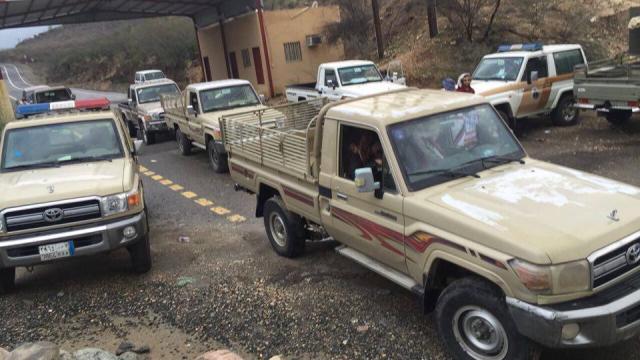Alwaght- A recently circulated video from the Saudi-Yemeni borders has revealed fresh dimensions of the critical conditions of the Saudi border-inhabited tribes. Earlier some Yemeni news agencies and social media activists had said that the Saudi government forced the tribes to leave their homes in the border areas. The new video is a confirmation of the reports about forced evacuation of the Saudi tribes from their homes on borders with Yemen.
The reports suggest that the forced evacuation of homes comes as the Saudi officials grow fears of cooperation of the border tribes with the Yemeni forces in the area. Saudi Arabia has been carrying out a bombing campaign for over 16 months in Yemen and has been trying to restore the resigned Yemeni President Abd Rabbuh Mansour Hadi to power. Riyadh is worried that collaboration of the Saudi tribes near the border with the Yemeni forces could foil effect of its air raids at Yemen.
The political sources said that the massive evacuation of the border areas by Al Saud regime comes as a result of fears that the residents of villages and towns in Saudi border areas could join the popular Yemeni forces, especially that a majority of the residents of these areas are said to be fed up with the suppressive acts of the Saudi government. Due to sectarian and ethnic drives Al Saud regime considers them second-class citizens because they are originally from Hejaz region in the Arabian Peninsula. On the opposite side are the people of Najd in Central Saudi Arabia who are enjoying special job and education privileges.
The evacuation operation comes after a direct order by Mohammad bin Salman, the defense minister and son of Saudi king Salman bin Abdulaziz. The order for urgent and compulsory evacuation was given after the Yemeni popular committees and army forces moved closer to the Saudi borders.
At the present time the evacuation process is focused on Bani Malik region in southwestern Saudi Arabia. The area is located in northeast of Jazan province. Earlier the Saudi authorities launched a campaign to evacuate inhabitants of Al Rabouaa, Faifa, Khoulan, and some other areas in Jazan and Asir. Many of the tribes that are forced to leave their houses are from Al Zaydan and Al Malik. They are said to have been historically at odds with Al Saud regime.
One of the videos made in the border areas shows how the Saudi armed forces are forcing tribes to leave their homes while they are reluctant to evacuate. The video is made in a checkpoint in Jazan near the Saudi-Yemeni borders. The area is announced dangerous by the Saudi officials and needed evacuation but the residents argue that their living place is safe and so refrain from leaving it.
No compensation is paid
According to Mohammad Shamrani, the governor of Bani Malik in Jazan region who was quoted by Sabagh online daily, the evacuation order was issued by the top officials in the Saudi ministry of interior. A large number of the villages of this region which is located between Saudi Arabia and Yemen were already evacuated. The Saudi official assured that no evacuation process goes without paying considerable financial compensation and finding solution for residence of the evacuated citizens. But many of the moved inhabitants denied that they were paid any compensation by Saudi government.
One of the evacuees who forcefully left his home is Mustafa. Until recently he was living in a village in mountainous area of Al Abadil. He said that the inhabitants of the village were forced to take orders of the authorities and so evacuated their homes a month ago.
Mostafa told the local reporter: “we were 800 residents who left the village. The authorities promised to financially compensate us and told us they give us homes in other areas of Jazan province. They formed a commission to evaluate the assets of the villagers."
“It has been a month that our village and the nearby villages were evacuated but we received no money, not a penny yet," Mostafa complained. He continued: “many of the villagers are farmers and stock breeders. Many of them now have to sell their livestock to pay for their life."
Mostafa added that the families left to the neighboring cities. Everybody managed his affairs as much as possible. Because the families are large most of them went to live with their relatives in different cities and so became separated.
“I do not understand why the government does not provide homes when it evacuates us, why it does not pay our compensation before we evacuate the villages, " Mostafa maintained.
“The Yemenis never attacked us”
One of the excuses the Saudi military holds when it forces people to leave their homes is that it wants to move them to safety from Yemen attacks. But the residents completely deny these allegations by Saudi Arabia. Mohammad from Jazan said that his village was never targeted by the Yemeni forces.
"The evacuation order was given to us on July 14. It gave us 72 hours to leave the region. We refused to obey. Our region is safe. For long years we have had agreements with the Yemeni tribes leaving on the other side of the border to avoid violations on our region. The Yemenis respect this deal," said Mohammad.
Mohammad continued: "our tribes are making living through farming and so they are afraid that they could end up without money when they evacuate their homes. No compensation was offered to us. The neighboring tribes that accepted to leave their homes were paid no compensation so far," Mohammad maintained.
The Bani Zayd tribe specifically has called on the Saudi border guards to stop violation of their rights. They reportedly arranged a complaint to argue why they are banned from construction in their own lands.
A member of the Saudi border tribe said: “This violation of our rights is not new. People from our tribes marry to people from Yemeni tribes who are living in other side of the border. We have been suffering from these (Saudi) discriminations for long years. We have a short access to the services, and we are marginalized politically and socially. The Saudi authorities in south of the country are persistently chasing the activists who are opposing them. The first forced departure took place in 2009. War on Yemen was not begun at that time. Now the buffer zone plan is their plot to get us out of our homes to provide their security."
The local reporter said that they phoned Jazan's governor but he threatened that he would implement the decision even forcefully. This took place when the border guards were told to implement the decision for evacuation without any delay."
The Saudi media talk very little about evacuation of the border villages.
According to Laurent Bonnefoy, a Yemen affairs analyst, the tensions between the Saudi border tribes and the Saudi government dates back to the 1930s.
In 1934 the three Yemen provinces of Jazan, Asir, and Najran were seized by Saudi Arabia and were annexed to its territory. Being originally Yemenis, the tribes found themselves in other side of the border away from their country Yemen. Many of them remained stranded between Saudi and Yemeni borders for months. This fanned tensions between Saudi officials and the tribes residing the border areas.
The tensions have pushed them to the sidelines and deprived them from development projects in their regions. A majority of the tribes living in border areas are Yemeni Shiite Muslims. The Saudi officials are highly worried about their possible collaboration with Yemen’s Nasrallah movement.



























